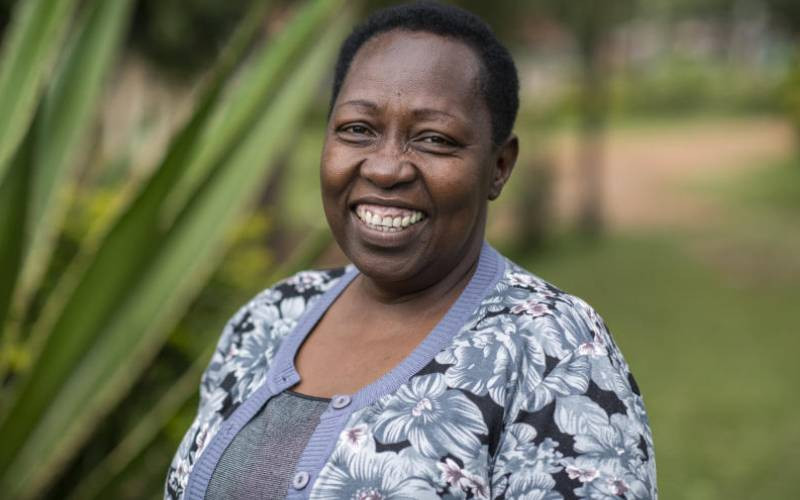
Dorothy Caroline Mabunde, a nurse cum research scientist from Butere is on the forefront in giving hope to children living with HIV and those with Sickle Cell disease and ensuring they live a normal life, get equal opportunities in life like education and become better citizens in future. She narrates how she started a community-based organisation that has changed the narrative about HIV and Sickle Cell in the area.
Briefly tell us about yourself...
I am the director of Don Amolo Memorial Kids Ark (DAMKA) located at Butere town in Kakamega county. I am the sixth born daughter in a family of 13 children. I went MM Shah Primary School in Kisumu. I joined Butere Girls High school and later Kenya Medical Training College - Homa Bay Campus. I am a mother of one daughter with two grandchildren.
How was the idea of starting DAMKA, a community-based organisation that takes care of Persons Living with HIV in your village conceptualised?
I had a brother called Don Amolo, who was a Malindi based lawyer and died in the 1990's. He had a heart of helping people that were not his relatives. Years later, I thought of doing something to keep his memory alive. When was a child, I used to see him educating people who were not my relatives. He was. All I wanted was to see people getting help through the blessings God has given me.
I had also lost some of my brothers in the 90's when HIV drugs were not readily available like it is nowadays. I couldn't allow someone to die because of not having access to Antiretroviral (ARV) drugs. I wanted to also use the knowledge I had to help the community and come 2012, Damka open its doors. Through Don Amolo CBO, I am now a mother of 450 children and 70 adults living with HIV.
Tell us what DAMKA deals with...
It's a community-based organization which supports children's club for orphaned and vulnerable children especially children living with HIV and children and families affected by Sickle Cell disease in Butere Sub-County, which is a rural community. The main aim to provide social support, increase adherence among kids, give hope and provide life skills to enable these kids live a meaningful life and eventually be who God intended them to be.
- How can I help my kids build stronger social skills?
- Money talk at the dinner table: Teach children value
- How to prepare your toddler for a new sibling
- Teaching kids to choose the right company early
Keep Reading
When you started the CBO, what were the main obstacles to Persons Living with HIV and how did you solve the problem?
When I started, we only had two centres where HIV patients can get treatment. It was a big challenge and stigma and discrimination being rife, victims opted to stay away. Many children who had the virus were being left to die because people didn't see the need to take them to school or hospital to get treatment, since they perceived that they will eventually die. The local community would get me reports of children who were suffering because of HIV and this really pained me. I vowed to bring hope to the community. Caregivers those days were mainly grandparents as biological parents were absent. Many times, I could take the kids to Kisumu where I stay, after treatment, I return them back.
How have you been able to fight stigma and discrimination to the extent of the children be accepted in the community?
All my children have grown up and families that used to segregate them, depend on them since they are now the bread winners and the story is slowly changing. I ensured they got get treatment, went to school and now some are in gainful employment. They are a living testimony that having HIV is not a death sentence but it's like any other disease. Every December, we give families time to come and celebrate Christmas with us and the one giving the invitation is the own living with HIV.
This is to show them that you cannot get the virus when you share a meal with the children. When a parent is sick, the program takes care of her medical bills and this has seen, the community accept our work.
For the grownups, when they want to marry or get married, they must tell their partners that they HIV. This helps reduce new incidences and many remind me of how I helped them. Stigma has now gone down.
How is DAMKA helping in reducing new HIV infections by 2030 in line with the government projections?
I don't think it will be possible to end new infections by 2030 as per the projections. HIV test kits are missing in our health facilities due to stock outs. This means those engaging in unprotected sex and don't know there status will still get infected.
Government must work around the clock and ensure test kits are available. We want to see test kits and ARV drugs available everywhere. In South Africa, HIV test kits are given even to pharmacies and accept results such outlets.
This has enabled them to have credible data that has helped them enhance the war towards eradicating the disease by 2030. Supply of condoms has been a problem unlike in the past where they were readily available, and for people who can't afford those dispensed in shops, chances of having unprotected sex are high and hence, ending HIV by 2030 will remain a pipe dream.
What were the challenges you faced when you started your organisation?
When I started the project at the house of my late brother that had a free space available. Started it on my salary and had no donor. After a few months, in ran into trouble with my brothers, thanks to being born from a polygamous. I was fought and ex communicated at home.
They thought that I got money from donors that I had refused to share with them. They even involved the chief to send me away. They even reported me Ministry of Health officials in Butere sub county and told them they don't want to see the project, instead, they (health officials) embraced me because there was no such a project, in Butere.
I was given a free space at two health centres and one at a government office where we don't pay rent. To date, it's now a success story.
 The Standard Group Plc is a multi-media organization with investments in media
platforms spanning newspaper print
operations, television, radio broadcasting, digital and online services. The
Standard Group is recognized as a
leading multi-media house in Kenya with a key influence in matters of national
and international interest.
The Standard Group Plc is a multi-media organization with investments in media
platforms spanning newspaper print
operations, television, radio broadcasting, digital and online services. The
Standard Group is recognized as a
leading multi-media house in Kenya with a key influence in matters of national
and international interest.

